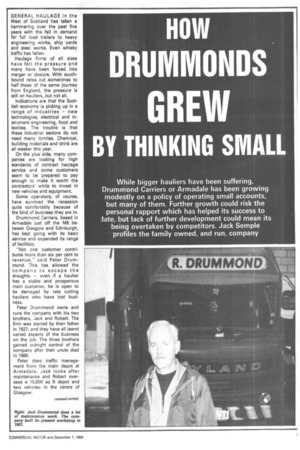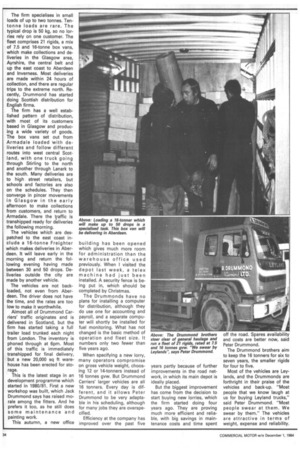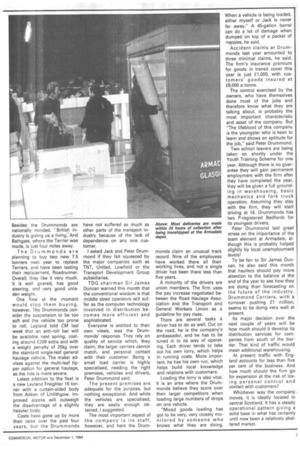HOW
Page 35

Page 36

Page 37

If you've noticed an error in this article please click here to report it so we can fix it.
DRUMMONDS
GREW
BY THINKING SMALL
GENERAL HAULAGE in the West of Scotland has taken a hammering over the past five years with the fall in demand for full load trailers to heavy engineering works, ship yards and steel works. Even whisky traffic has fallen.
Haulage firms of all sizes have felt the pressure and many have been forced into merger or closure. With southbound rates cut sometimes to half those of the same journey from England, the pressure is still on hauliers, but not all.
Indications are that the Scottish economy is picking up in a range of industries — new technologies, electrical and instrument engineering, food and textiles. The trouble is that these industrial sectors do not need many lorrries, Chemical, building materials and drink are all weaker this year.
On the plus side, many companies are looking for high standards of contract haulage service and some customers seem to be prepared to pay enough to make it worth the contractors' while to invest in new vehicles and equipment.
Some operators, of course, have survived the recession quite comfortably because of the kind of business they are in. Drummond Carriers, based in Armadale just off the MB be tween Glasgow and Edinburgh, has kept going with its basic service and expanded its range of facilities.
"Not one customer contributes more than six per cent to revenue," said Peter Drum mond. This has allowed the company to escape the draughts — even if a haulier has a stable and prosperous main customer, he is open to be damaged by rate cutting hauliers who have lost business.
Peter Drummond owns and runs the company with his two brothers, Jack and Robert. The firm was started by their father in 1927, and they have all learnt varied aspects of the business on the job. The three brothers gained outright control of the company after their uncle died in 1980.
Peter does traffic management from the main depot at Armadale, Jack looks after maintenance and Robert overseas a 10,000 sq ft depot and two vehicles in the centre of Glasgow. The firm specialises in small loads of up to two tonnes. Tentonne loads are rare. The typical drop is 50 kg, so no lorries rely on one customer. The fleet comprises 21 rigids, a mix of 7.5 and 16-tonne box vans, which make collections and deliveries in the Glasgow area, Ayrshire, the central belt and up the east coast to Aberdeen and Inverness. Most deliveries are made within 24 hours of collection, and there are regular trips to the extreme north. Recently, Drummond has started doing Scottish distribution for English firms.
The firm has a well established pattern of distribution, with most of its customers based in Glasgow and producing a wide variety of goods. The box vans set out from Armadale loaded with deliveries and follow different routes into west central Scotland, with one truck going through Stirling to the north and another through Lanark to the south. Many deliveries are to high street retailers, but schools and factories are also on the schedules. They then converge in pincer movements in Glasgow in the early afternoon to make collections from customers, and return to ArmadaIe. There the tzaffic is transhipped ready for deliveries the following morning.
The vehicles which are despatched to the east coast include a 16-tonne Freighter which makes deliveries in Aberdeen. It will leave early in the morning and return the following evening having made between 30 and 50 drops. Deliveries outside the city are made by another vehicle.
The vehicles are not backloaded, not even from Aberdeen. The driver does not have the time, and the rates are too low to make it worthwhile.
Almost all of Drummond Carriers' traffic originates and is delivered in Scotland, but the firm has started taking a full trailer load trunked each night from London. The inventory is phoned through at 6pm. Most of this traffic is immediately transhipped for final delivery, but a new 20,000 sq ft warehouse has been erected for storage.
This is the latest stage in an development programme which started in 1980/81. First a new workshop was built, which Jack Drummond says has raised morale among the fitters. And he prefers it too, as he still does some maintenance and painting work.
This autumn, a new office building has been opened which gives much more room for administration than the warehouse office used previously. When I visited the depot last week, a telex machine had just been installed. A security fence is being put in, which should be completed by Christmas.
The Drummonds have no plans for installing a computer for distribution, although they do use one for accounting and payroll, and a separate computer will shortly be installed for fuel monitoring. What has not changed is the basic method of operation and fleet size. It numbers only two fewer than five years ago.
When specifying a new lorry, many operators compromise on gross vehicle weight, choosing 12 or 14-tonners instead of 16 tonnes gvw. But Drummond Carriers' larger vehicles are all 16 tanners. Every day is different, and it allows Peter Drummond to be very adaptable in his scheduling, although for many jobs they are overspecified.
Efficiency at the company has improved over the past five years partly because of further improvements in the road network, in which its main depot is ideally placed.
But the biggest improvement has come from the decision to start buying new lorries, which the firm started doing four years ago. They are proving much more efficient and relia ble, with big savings in maintenance costs and time spent off the road. Spares availability and costs are better now, said Peter Drummond.
The Drummond brothers aim to keep the 16 ton ners for six to seven years, the smaller rigids for four to five.
Most of the vehicles are Leylands, and the Drummonds are forthright in their praise of the vehicles and back-up. "Most people that we know laugh at us for buying Leyland trucks," said Peter Drummond. "Most people swear at them. We swear by them." The vehicles are attractive in terms of weight, expense and reliability. Besides the Drummonds are nationally minded. "British industry is giving us a living 'And Bathgate, where the Terrier was made, is just four miles away.
The Drummonds are planning to buy two new 7.5 ton ners next year to replace Terriers, and have been testing their replacement, Roadrunner. Overall, they like it very much. It is well geared, has good steering, and very good unladen weight.
One flaw at the moment would stop them buying, however. The Drummonds consider the suspension to be too soft and the vehicle too prone to roll. Leyland told CM last week that an anti-roll bar will be available next spring, costing around £200 extra and with a weight penalty of 25kg over the standard single-leaf general haulage vehicle. The maker advises against the multi-leaf tipper option for general haulage, as the ride is more severe.
Latest addition to the fleet is a new Leyland Freighter 16 tonner with a curtain-sided body from Aitken of Linlithgow. Improved access will outweigh the disadvantage of a slightly heavier body.
Costs have gone up by more than rates over the past four years, but the Drummonds have not suffered as much as other parts of the transport industry because of the lack of dependence on any one customer.
I asked Jack and Peter Drummond if they felt squeezed by the major companies such as TNT, United, Lowfield or the Transport Development Group subsidiaries.
TDG chairman Sir James Duncan warned this month that the conventional wisdom is that middle sized operators will suffer as the computer technology involved in distribution becomes more efficient and sophisticated.
Everyone is entitled to their own views, was the Drummonds' response, They rely on quality of service which, they claim, the larger carriers cannot match, and personal contact with their customer. Being a small load carrier is highly specialised, needing the right premises, vehicles and drivers, Peter Drummond said.
The present premises are adequate for the purpose, but nothing exceptional. And while the vehicles are specialised, they are easily enough obtained, I suggested.
The most important aspect of the company is its staff, however, and here the Drum monds claim an unusual track record. Nine of the employees have worked there all their working lives, and not a single driver has been there less than five years.
A minority of the drivers are union members. The firm uses the pay increase negotiated between the Road Haulage Association and the Transport and General Workers Union as a guideline for pay rises.
There are several tasks a driver has to do as well. Out on the road, he is the company's ambassador, and he has to be tuned in to its way of operating. Each driver tends to take out his own lorry, which helps in running costs. More important, he has his own run, which helps build local knowledge and relations with customers.
Loading the lorry is also vital. It is an area where the Drummonds believe they score over their larger competitors when loading large numbers of drops on one vehicle.
"Mixed goods loading has got to be very, very closely monitored by someone who knows what they are doing. When a vehicle is being loaded, either myself or Jack is never far away." A 45-gallon barrel can do a lot of damage when dumped on top of a packet of nappies, he said.
Accident claims at Drummonds last year amounted to three minimal claims, he said. The firm's insurance premium for goods in transit cover this year is just £1,000, with customers' goods insured at £6,000 a tonne.
The control exercised by the owners, who have themselves done most of the jobs and therefore know what they are talking about, is probably the most important characteristic and asset of the company. But "The lifeblood of this company is the youngster who is keen to learn and shows an aptitude for the job," said Peter Drummond.
Two school leavers are being taken on shortly under the Youth Training Scheme for one year. Although there is no guarantee they will gain permanent employment with the firm after they have completed the year, they will be given a full grounding in warehousing, basic mechanics and fork truck operation. Assuming they stay with the firm, they will start driving at 18. Drummonds has two P-registered Bedfords for its youngest drivers.
Peter Drummond laid great stress on the importance of the team element at Armadaie, although this is probably helped slightly by local unemployment levels!
To be fair to Sir James Duncan, he also said this month that hauliers should pay more attention to the balance at the end of the year to see how they are doing than forecasting on the future of the industry. Drummond Carriers, with a turnover pushing El million, seems to be doing very well at present.
Its major decision over the next couple of years will be how much should it develop its distribution services for companies from south of the border. That kind of traffic would mean additional warehousing.
At present traffic with England accounts for less than five per cent of the business. And how much should the firm -go, for expansion at the risk of losing personal control and contact with customers?
Whichever way the company moves, it is ideally located in central Scotland. It has a steady operational pattern giving a solid base in what has certainly until now been a relatively sheltered market.




























































































